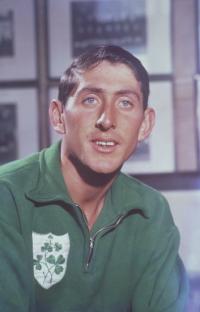Larry Ryder reflects on Ronnie Delany’s win
Published in 20th-century / Contemporary History, Features, Issue 4 (July/August 2012), Volume 20
Ronnie Delaney—picked up in New York on the way to Melbourne. (INPHO/Allsport)
The mid-1950s were definitely grey. A coalition government had gained power from Fianna Fáil. The unemployed workers marched in the streets but there were no jobs for them. Many workers left Ireland; the picture of them crowding onto the mail boat in Dún Laoghaire is etched deep in many people’s memories, including my own. Our cattle were also sent abroad, on the hoof, at a great loss to Ireland. In sport our football team rarely won, and hit perhaps its biggest headlines in Archbishop McQuaid’s failed efforts to get the public to boycott a game against the communists of Yugoslavia, a game for which I was delighted to skip off school, with a pedagogical nod and wink. Our rugby team fared little better and won the wooden spoon a bit too often for comfort. Into this international sporting wilderness came Ronny Delany and the 1956 Olympic Games in Melbourne.An early result of Delany’s success was the opening of the new track at Santry—with a bang! The world record was broken at one, two and three miles. The one-mile event saw five men break the four-minute mile barrier. Billy Morton had organised international meetings, with Delany as the main attraction, and used the profits to open the track. Perhaps the greatest moment in the history of what is now Morton Stadium was when the first two home in the mile event, Herb Elliot and Merv Lincoln, broke the previous world record.Even the national mood lifted by the late 1950s, and who is to say what part Delany’s success played in creating a more confident, outward-looking Ireland?
















